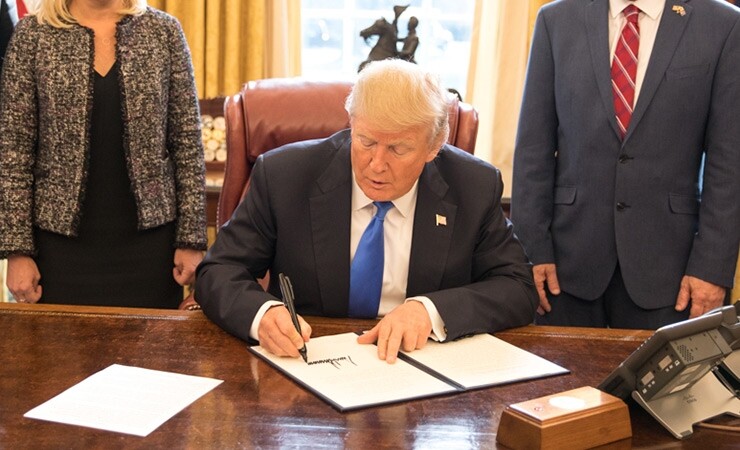
President Trump signing an executive order in January 2018.
(Image credit – The White House / Shealah Craighead)

President Trump signing an executive order in January 2018.
(Image credit – The White House / Shealah Craighead)
President Trump issued an executive order
Agencies that support scientific research have established numerous FACA committees that are covered by the order. Comprising volunteers from the scientific community, these committees are routinely tasked with reviewing agency activities and conferring official recommendations. Committee meetings also serve as public forums at which committee members receive briefings from agency officials and discuss issues of common interest to the agency and researchers.
The federal government maintains a database
In directing agencies to terminate FACA committees, Trump’s order spotlights those that have accomplished their stated objectives, address an “obsolete” subject matter, and perform functions that have been assumed by another entity. It also points to committees for which an “agency determines that the cost of operation is excessive in relation to the benefits to the federal government.”
Although the order does not limit terminations to such committees, it does allow agencies to request waivers from the White House Office of Management and Budget if they regard more than two-thirds of their FACA committees as indispensible. Under the order, the OMB director may grant a waiver if a committee is determined to be “necessary for the delivery of essential services, for effective program delivery, or because it is otherwise warranted by the public interest.”
Agencies are also permitted to count toward their compliance any committees they have already terminated since the beginning of the Trump administration. It is not clear whether agencies will be allowed to consolidate committees. Agencies that support fewer than three FACA committees subject to termination are exempted from compliance, as are “independent regulatory agencies,” a category comprising 19 agencies that includes the Nuclear Regulatory Commission, but not, for instance, the Environmental Protection Agency.
Going forward, the order restricts the creation of new committees by capping the government-wide number of FACA committees at 350, exclusive of those required by statute, established by presidential directive, or supported by independent regulatory agencies. Once the cap has been met, agencies must secure a waiver from OMB to set up a new committee.
Although committees established by presidential directive are not counted toward agencies’ committee limit, the order also requires agencies to recommend by Aug. 1 whether any such committees they support should be continued. Agencies are also required to submit a “detailed plan” by the same date for the termination or continuation of committees required by statute, including recommendations for any necessary legislation.
Outside of merit review panels, most FACA committees supported by science agencies are subject to potential termination under Trump’s order.
Some of these, such as the six committees
Although it does not oversee an analogous planning process, DOE’s Basic Energy Sciences Advisory Committee is also highly active. Through its various reports
Other agencies use their FACA committees in concert with non-FACA groups. NASA, for instance, supports the NASA Advisory Council under FACA, and in 2016 it decided
The National Science Foundation currently supports a large number
Some science advisory committees created under FACA are exempted from possible termination at this time. For example, the Astronomy and Astrophysics Advisory Committee, which advises NASA, NSF, and DOE, was mandated by the NSF Authorization Act of 2002. Several EPA committees, including its Science Advisory Board, are also established by law. NSF’s committee that recommends recipients for the National Medal of Science is similarly exempted because it was established by presidential directive.
In general, though, unless science agencies seek and secure waivers from OMB, it is unlikely they will be able to comply with Trump’s order without disrupting their current arrangements for obtaining input from the scientific community. How they respond, and whether Congress weighs in, are matters that will unfold as the summer continues.